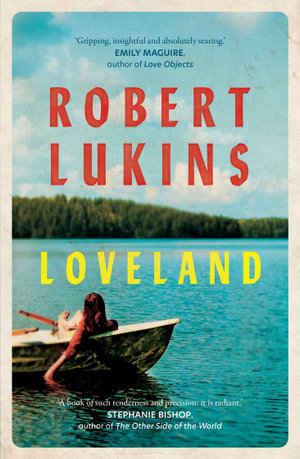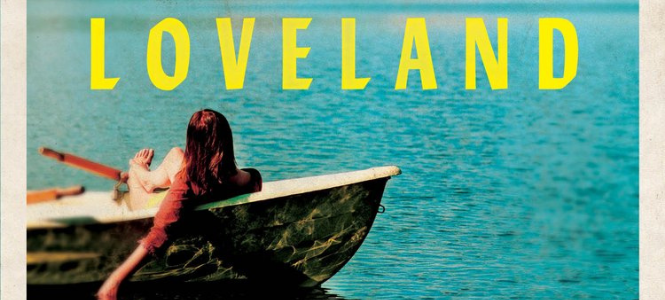Robert Lukins is a writer living in Melbourne. His debut novel, The Everlasting Sunday, was published in 2018 and was nominated for several major literary awards. His writing has appeared in Meanjin, Rolling Stone, Overland, The Big Issue, and other odd places.
Today, Robert Lukins is on the blog to answer a few of our questions about his new novel, Loveland. Read on …
Please tell us about your book, Loveland!
RL: Loveland is the story of an Australian woman, May, who is drawn to Nebraska to claim a house on a poisoned lake as part of her grandmother’s will, and by doing so escape the control of her husband. As she starts repairing the old house, May discovers more about her silent, emotionally distant grandmother and unravels the secrets that her grandmother had moved halfway around the world to keep hidden.
Where did you get the first spark of inspiration for this story, and why was it important to you to write it?
RL: As always with my experience of writing, it feels as if the story came from a thousand loose threads getting pulled together, though there was a particular origin moment for Loveland. I was camping on the side of a mountain in Tasmania and one morning walked to the mountain peak as the sun was rising somewhere behind the fog. I was standing there alone and freezing when a vivid image arrived in my mind, of two women standing in the shallows of a lake while around them everything burned. It’s the only time I have had such a clear spark of an idea for a story and I have no idea where it come from, but the writing of Loveland was basically an attempt to write a story around that image that felt real – all the things that lead to and away from those two women in the lake.
What appealed to you about using Nebraska as the setting for Loveland?
RL: I have been fixated on Nebraska since I was a child. Someone in my family had the Bruce Springsteen album, Nebraska, and I remember being transfixed by the photograph on the record sleeve. A picture of an empty highway disappearing into a seemingly infinite landscape. It always felt so mysterious and full of possibility. Nebraska seemed like the kind of place a person would escape to.
Your first novel, The Everlasting Sunday, was nominated for many awards and is beloved by so many Australian readers. What kind of an impact has this success had on the writing of your second novel?
RL: The publication of my first novel was such an enjoyable experience. I realised that working with and getting to meet so many people devoted to books was something I was missing and is so gratifying. Writing this second novel was at a day-to-day level very similar to the writing of everything else that came before it. Ultimately it’s still just you, alone in a room and faced with a blank screen. Though, away from my desk I felt like I had a lot of support around me, and that I was now a very small piece of a great world of books and reading, which is all I’ve ever wanted.
‘It had also been a place that I had invented a strange version of in my mind. It was a mystery that I had filled with a childhood of dreaming. So this was the Nebraska I wrote for my characters, the one I knew: a place caught between reality and myth.’
What was the most challenging part of the writing process for Loveland? How did you overcome it?
RL: In the weeks before Covid first hit I had booked a research trip to Nebraska. I was going to wander the plains and explore this place and find my story’s setting. But becoming housebound, like everyone else, I thought for a moment that this might be the end of Loveland. Time passed though and the story wouldn’t leave me. I realised that my inability to travel gave me an opportunity to approach the writing of Loveland in a new way. I had be fascinated by Nebraska all my life and had read everything I could get my hands on about its people, history, geography, and wildlife, but it had also been a place that I had invented a strange version of in my mind. It was a mystery that I had filled with a childhood of dreaming. So this was the Nebraska I wrote for my characters, the one I knew: a place caught between reality and myth.
Can you tell us a little bit about your journey towards becoming a writer?
RL: I wrote my first novel when I was about fourteen and then wrote about one a year, every year since. I was trying to teach myself how to write but I think I was also a bit terrified of the idea of sending one of these things out into the world and finding out it stunk. So I would write these novels and never show them to anyone. Eventually I realised that I needed to either send one of these things out or just quit, so I printed out my latest manuscript and posted it off to a publisher. I didn’t hear a thing for eighteen months and then they got in touch and said they wanted to publish it. That was my first novel, The Everlasting Sunday, and I’ve felt incredibly fortunate ever since.
What is the last book you read and loved?
RL: The most recent book I’ve loved is A History of Dreams by Jane Rawson, which is being published in April. Rawson is one of Australia’s best and most surprising writers and this new novel is a wonderous thing.
What do you hope readers will discover in Loveland?
RL: I hope they will find a world where the wall between reality and the imagination can be permeable. When pushed, people will cross lines they never thought possible.
And finally, what’s up next for you?
RL: Writing, reading. Always writing and reading. I’m up to my neck in a new novel that is consuming all of my attention at the moment and I wouldn’t have it any other way.
Thanks Robert!
—Loveland by Robert Lukins (Allen & Unwin) is out on 1 March. Signed copies are available while stocks last!

Loveland
Limited Signed Copies Available!
Amid the ruins of a fire-ravaged amusement park and destroyed waterfront dwellings, one boarded-up building still stands. May has come from Australia to Loveland, Nebraska, to claim the house on the poisoned lake as part of her grandmother's will. Escaping the control of her husband, will she find refuge or danger?
As she starts repairing the old house, May is drawn to discover more about her silent, emotionally distant grandmother and unravel the secrets that Casey had moved halfway around the world to keep hidden...








 Bestsellers: Scott Pape and Ash Barty continue to prove a hit with readers!
Bestsellers: Scott Pape and Ash Barty continue to prove a hit with readers!  Bestsellers: Jane Harper and Aunty Donna prove a hit with readers!
Bestsellers: Jane Harper and Aunty Donna prove a hit with readers!
Comments